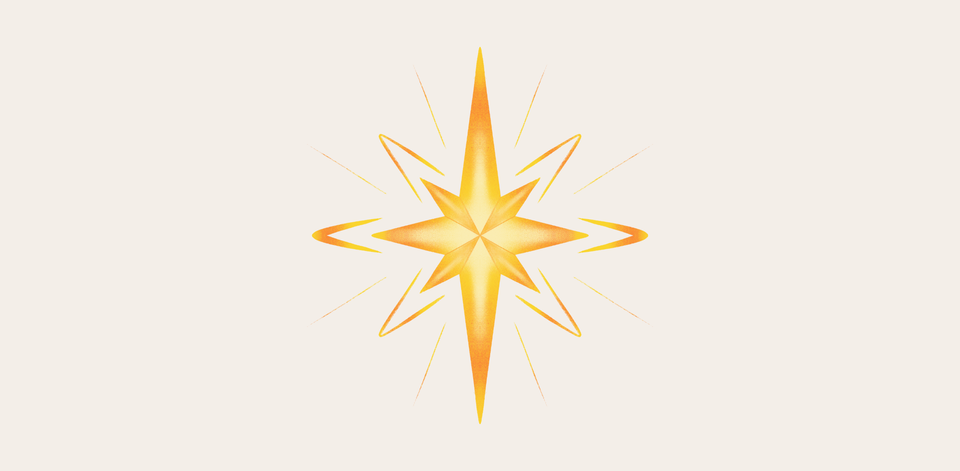The North Star (On Feeling Lost in Life)

In October 2022, the analogy of the North Star first glimmered its way into my journal as an intriguing idea. At the time, I was struggling to figure out the role that goals should play in the way I move forward:
Studying (and experiencing) the reality of the Arrival Fallacy over and over again, I'd become a little disillusioned by a life purely driven by achieving goals. This perpetual cycle left me a little empty:
- Set ambitious goals,
- Strive with the promise of contentment when I get there,
- Find out that someone had sneakily moved the goal post when I blinked and contentment was now conditional on the next thing.
Adding insult to injury, the goal post thief (aka me) was so good at his craft that I barely noticed the theft: Whenever I arrived where I'd set out to arrive, I was already fully invested in the next thing without ever realising the change.
Life is so subtle sometimes that you barely notice yourself walking through the doors you once prayed would open.
Put simply, I found that predicating my happiness on the condition of some arbitrary goals was like following a mirage through the desert, continually convinced that the next oasis was the real deal. It's a strange way to live - but if it's not this, what do I do with myself? To give up the idea of goals altogether doesn't feel particularly aspirational either. A life without goals seems a little dull, lacking flavour and zest, oddly aimless. So, what do we do here? Well, here's the original journal entry; 22 October 2022:
Goals are important, but like plans, they are just a statement of present intention - nothing more and nothing less.
It’s like sailors back in the day navigating with the north star - they didn’t necessarily arrive at the north star, but it lends a direction to focus your efforts towards.
There's a certain beauty to this image: The North Star. For millennia, ships have sailed the endless seas simply by keeping in their sights the northern circumpolar constellation of Ursa Minor. Yet no one has ever gotten there. What's more, no one ever even intended to get there.
It's this precise combination that, to me, addresses the need for orientation, but also the issue of fixation. To define a direction that keeps you from spinning around aimlessly in uncharted territory - it's essential to making any sort of meaningful progress into any direction. But this rings true even more when you're sailing through uncharted territory, where you'll inevitably have to change course every time you learn something new.
A sailor determined to go towards the goal in a straight line will inevitably crash their ship into the first island that happens to cross their path. Yet one with a North Star will be able to incorporate new information (such as "there's an island here and we can't quite fly") as it arises and adjust direction accordingly without ever losing sight of where they're going.
This is what I find perfectly encompassed in a goal as a "statement of present intention". It's a reflection of my current priorities, what is important and meaningful to me right now. Aligned with the north star, this is the angle of orientation. Yet, making goals the condition of my well-being an easy way to fall into fixation.
The idea that my journey must go precisely the way I'd imagined it before (since otherwise I'm not allowed to be happy) is a dangerous one, on many levels. Not only do I run the risk of ignoring what is right in front of me (think Titanic & the Iceberg), I close myself off to the vibrant world that's all around me because of my tunnel vision.
This is uncharted territory. As far as I know, no one's ever lived my life before - including me. Therefore, to think that what I considered the best path a year ago (as represented by my goals) isn't subject to adjustment when I learn new things - surely that's a bit misguided. I didn't have it figured out a year ago, and I don't today. Instead, I'm simply in a constant process of figuring out, adjusting as I go on and learn more about the territory. But as long as I move in accordance with my North Star, I can be perfectly content in the peaceful certainty that I'm going where I need to go.
You’re free to dream, but you’re equally free to save yourself the despair of assuming that it’ll come exactly the way you dreamt. When sailing through uncharted territory, you might have to change directions more than once - this is the gift of a life not spent standing still. And in no aspect does this approach become more salient than in the ubiquitous ideal of balance.
After years of hearing people speak about "work-life balance" etc., I get the feeling that many imagine "balance" to be a stable state to be achieved, quite akin to a classic goal. In other words, "balance" seems like a place you wanna get. And once you finally get there, things will be all serene and harmonious, integrated and whatever other buzzword you wanna throw at it. Only that as far as I know, no one's ever "achieved balance" in the way that one might get a college degree. In the words of Oliver Burkeman, author with 20+ years of experience trying:
“Nobody in the history of humanity has ever achieved 'work-life balance', whatever that might be, and you certainly won’t get there by copying the ‘six things successful people do before 7am’. The day will never arrive when you finally have everything under control, when the fully optimised person you’ve become can turn to the things life is really supposed to be about.
And you know why? Because there's no there there. To "get there" implies that there were a static place at which one could arrive. But in a moving system there's no balance, only balancing. Consider riding a bike. Tiny movements left and right keep you from falling over and you move graciously into the sunset. Great stuff. But do you ever achieve balance? Of course not - in the absence of those little movements you'd fall over in an instant. Or for the yogis out there, consider all those little muscular adjustment in your ankle that keep a balancing asana upright. Anything resembling a "state of balance" on the surface is nothing but the continuous process of balancing. Sometimes it just takes the little adjustments, and sometimes you have to rudder your arms around like a windmill, but you're never done balancing.
This is the beauty of the North Star: Some things are worth aiming for - even if you have no chance of ever arriving there. Balance is one of them. And with the North Star analogy in mind, you can let go of the idea that you'll ever arrive. You can stop beating yourself up for the fact that you haven't achieved balance yet. Nonetheless, you can take the direction to align your actions. Sure, one day you might overcorrect a little too much in one direction, then in another, then in a third - but there's nothing wrong with that at all: Precisely this is the process of balancing.
Beautiful philosophising, I know. But all this wordplay is wonderfully vague - What does it mean in practice? Well, I have two points to cap this off:
1. What the hell is my North Star?
This entire endeavour hinges on the assumption that you can clearly see your North Star. So what if you can't?
This was precisely the issue I was facing when I came back to Europe after years abroad. I'd given up my life down there only to find that I had no real clue who I was up here, and accordingly I was spinning in circles, genuinely feeling disorientated. Somehow, I couldn't trust my own judgement anymore because I had no clue what direction the compass was pointing today - and where it would point tomorrow. It wasn't until I followed the advice that my dear friend Liam gave me weeks before that I found a little peace: "When nothing makes sense, go back to your values."
It was such a simple fix for something that had caused me so much headache: I simply took 30mins to go through a few worksheets and clarify my values, et voilà: The North Star. I have to admit I felt kinda stupid for not doing this earlier, given this is the foundation of ACT (my favourite school of therapy), but I guess sometimes you gotta spin in circles for a bit.
At any rate, here's a starting point if you wanna try it yourself.
2. Qualitative vs Quantitative Evaluation
Got some values? Cool - you've unlocked a new angle to look at your life from. In scientific inquiry, we have two main modes of operation:
- Quantitative data is all about numbers (think IQ, number of gummy bears eaten),
- Qualitative data is all about complexity (think case studies of individual people).
The core benefit of this values-based approach is that it gets rid of the quantitive pressure that classic “productivity goals” and comparative thinking often instil in us. In practical terms:
Often at the end of a week, I find myself in this slight sense of unease because I haven’t done enough. I imagine a week with no interruptions in which I made so much more progress on my projects and automatically conclude that this week simply wasn’t a good one, simply because I could’ve done more. Purely quantitative evaluation.
But here’s a funky idea: A week might be worth more than just its quantified instrumental utility for the next one. With a North Star in mind, there’s another option: Qualitative Evaluation.
You can shift your focus away from how much you're doing to whether the things you're doing align with your values. Of course, this is not just limited to work - qualitative evaluation takes into account how you showed up for those you care about, if you worked the way you’d like to, how you handled the inevitable unexpected fires that you had to put out, and so many more aspects of your wonderfully complex life.
To reduce a whole human week to a quantitative measure of productive output is bound to lose the vivid complexity that really took place. And for what? For a metric of pace towards a finish line bound to lose its appeal two days after you set the new record, because by that point the timer’s already running for the next one. Sounds like a pretty shitty trade to me.
Now, are we to give up on goals altogether then? Not quite, I believe. Setting waypoints aligned with your current understanding of your world, making steady progress towards them while acknowledging the ever-evolving and uncharted landscape they’re nested into - that’s still very helpful. After all, pursuing projects you care for is simply good fun. But with qualitative evaluation in mind, you can pursue these projects for their own sake. They don’t have to shoulder the weight of your entire happiness anymore, which is quite helpful given the fact that they were never able to shoulder it anyways. Instead, goals transform from arbitrary milestones into dynamic reflections of your values. And they’re damn good at being that - way better than their old role.
In the end, the simple antidote to our innate tendency of rushing from one finish line to the next might simply be to set our sights on things without a finish line. The same way balance isn’t something to be accomplished, I have yet to meet someone that has “finished” their values.
All you can do with values is live them, day in and day out. And isn't that enough?




Comments ()